Israel announced on Monday that it has declassified intelligence regarding a secret financial hub for Hezbollah located beneath a hospital in Beirut. According to the Israel Defense Forces (IDF), this bunker allegedly contains hundreds of millions of dollars in cash and gold intended to finance the group’s operations.
This revelation follows a series of targeted airstrikes conducted by the Israeli Air Force on Sunday night, which aimed to disrupt Hezbollah’s financial infrastructure. During a televised briefing, IDF spokesperson Rear Admiral Daniel Hagari stated, “I am declassifying intelligence on a site that we did not strike—where Hezbollah has millions of dollars in gold and cash in Hassan Nasrallah’s bunker, located directly under Al-Sahel Hospital in Beirut.”
Hagari claimed that the bunker contains at least $500 million in cash and gold, which could potentially be used to support Lebanon’s recovery efforts. Sunday’s airstrikes targeted nearly 30 locations linked to Hezbollah, including sites operated by Al-Qard Al-Hassan (AQAH), a financial entity accused of facilitating Hezbollah’s access to cash and gold.
Hagari noted that one of the main targets was an underground vault with tens of millions of dollars in cash and gold, allegedly intended to finance attacks against Israel. He did not specify whether all the funds were destroyed in the airstrikes but indicated that further operations targeting financial centers could occur.
The strikes are part of a broader Israeli campaign to undermine Hezbollah’s financial network, which has intensified recently. IDF Chief of Staff Lt. Gen. Herzi Halevi mentioned that over 300 strikes were executed on Hezbollah positions within a 24-hour period, focusing on vital financial and logistical sites.
Al-Qard Al-Hassan, operating in Lebanon since the 1980s, is officially categorized as a charity but is viewed by Israeli and U.S. officials as a crucial part of Hezbollah’s financial operations, allowing the group to launder money and fund its activities under the guise of civilian banking.
Hagari highlighted that Hezbollah’s financial support mainly comes from the Lebanese public and the Iranian regime, with funds transferred through Syria and gold smuggled into Lebanon from Iran. Factories in Lebanon, Syria, Yemen, and Turkey are also alleged to contribute significantly to Hezbollah’s income.
In a related operation, Israel conducted an airstrike in Syria targeting the head of Hezbollah’s financial unit, known as Unit 4400, which oversees Iranian funding to the group. The unnamed commander was reportedly killed in the strike, marking the second significant assassination of a Hezbollah financial figure in recent weeks.
These developments occur amid escalating tensions between Hezbollah and Israel, which have intensified since Hezbollah’s recent attacks in solidarity with Hamas after the October 7 attacks in 2023. Israeli officials estimate that around 2,000 Hezbollah fighters have been killed since the conflict escalated in late September 2023, as Hezbollah has retaliated with rocket attacks on Israeli towns and military installations.






















